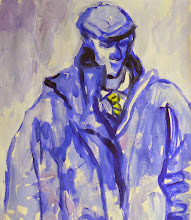With my head full of little poetic gems I considered it would be a skoosh writing three line poems with an air of Scottish mystery. Only to find I hadn't a clue.
With the birth of my new wee grandson and the huge feelings of joy filling my heart I thought I could just produce these expressions of love as easy as fa'ing aff a bus:
dark damp hair
wee petted lip
just like his grand-faither.Like looking in a mirror
lying in my airms
his DNA is certain.
I meet him
for the very first time
grand-faither, grand-son.Bonny baby boy
my ain wee china
contentment.Somethings not right. I turn to Jane Reichhold's "Writing and Enjoying Haiku" which just arrived in the post yesterday.

And she says right at the start that there are four things to do before writing Haiku:
1. Learn how to read Haiku.
2. Know why you want to write Haiku.
3. Be ready to change your ideas of Poetry, and
4. Find out what Haiku is.
I only know what I have already seen and it has such a powerful attraction to me.
I certainly know why I want to write Haiku: living in and capturing the moment.
I have already changed my idea of what poetry is.
I know I need to study the form lots more than I have so far.
But the two principal lessons I have learned already through Jane Reichhold is, firstly Haiku is purely about what the author observes, not about "telling others what I think or how I feel, or believe or wish to have thought as reality" and "putting away of personal pronouns" which are "ego-inflating.
This is fantastically liberating.
The second lesson for today is to learn humility since the Haiku poems are "gifts" - they come through you, but are not yours.
Try again:
 Cadmium orange
Cadmium orange
peels away
juicy sun-kiss.




